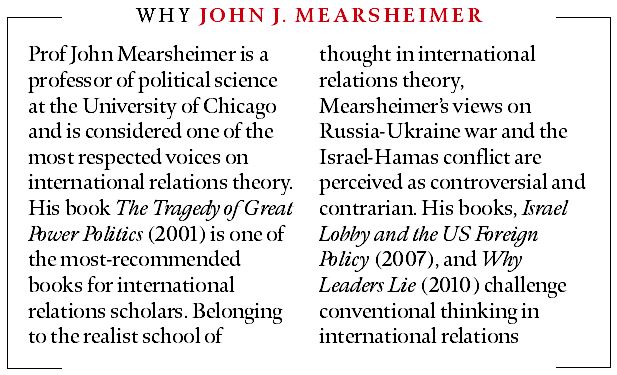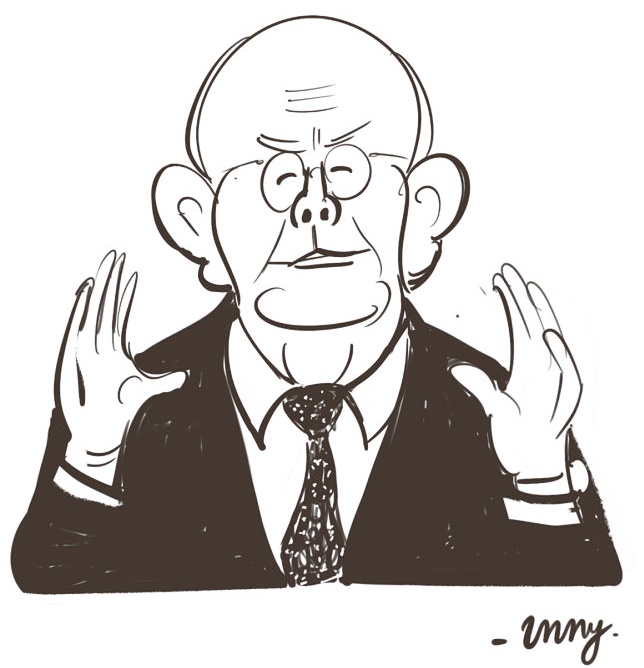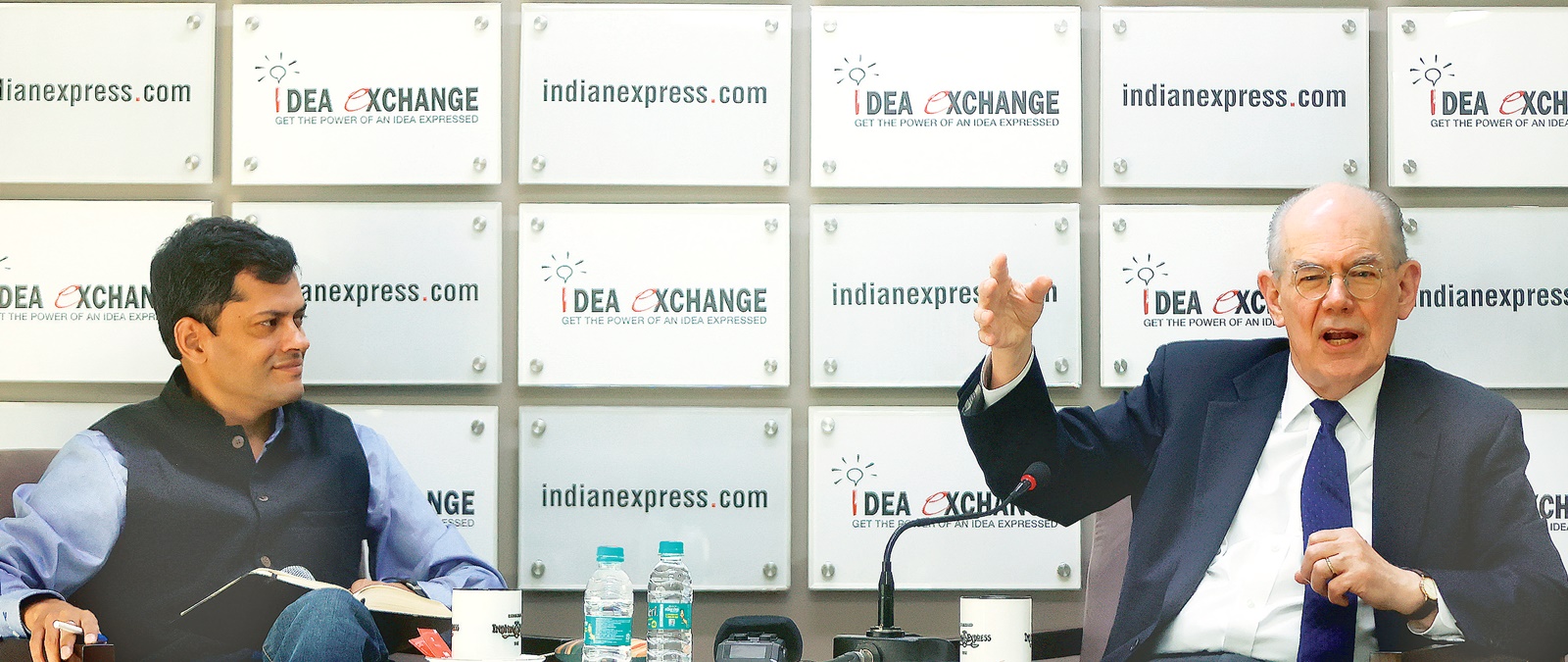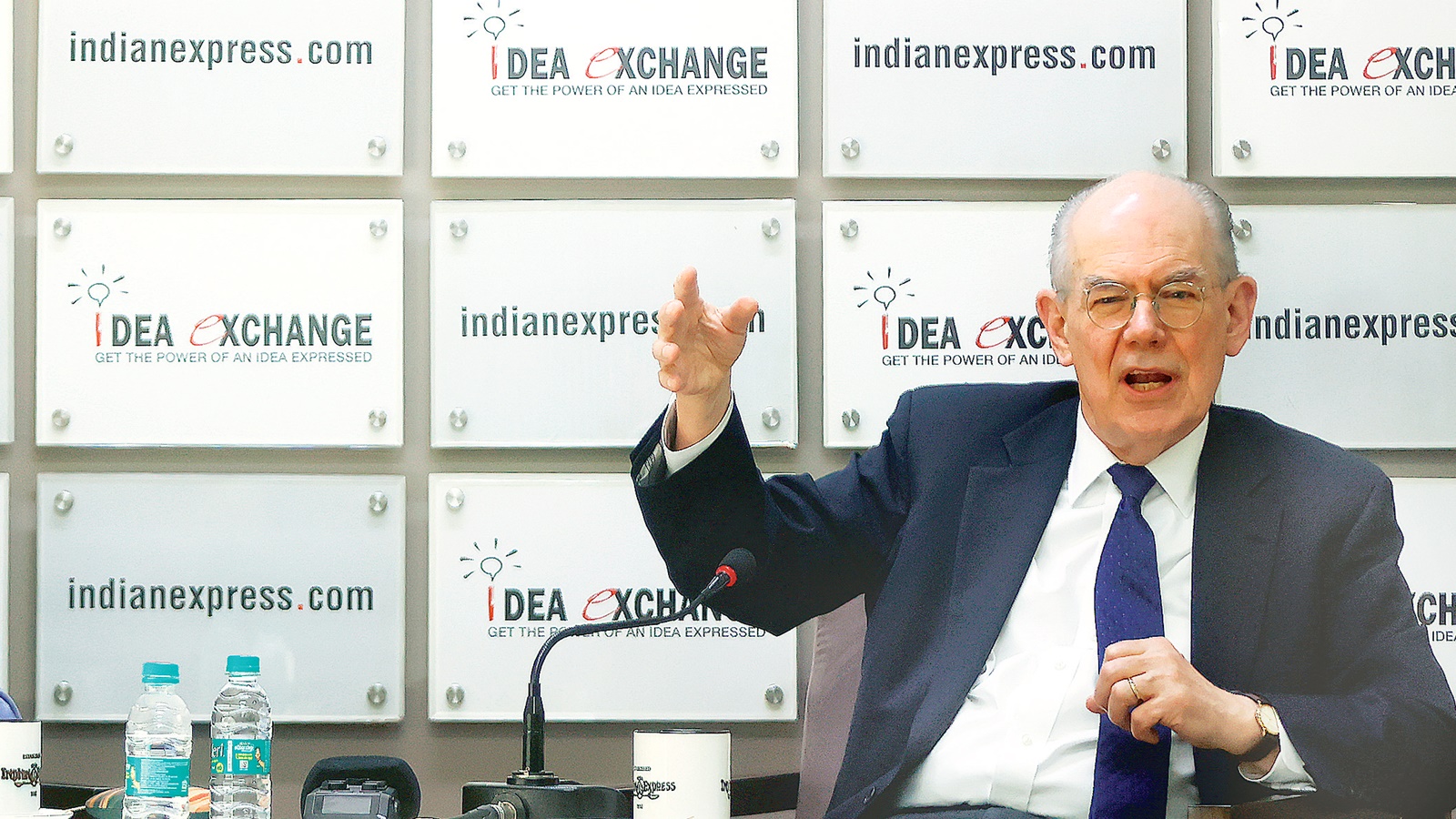Political scientist John J Mearsheimer on US-India ties, why China wants to be powerful, the Russia-Ukraine conflict and the power of the Israel lobby in the US. This conversation was moderated by Shubhajit Roy, Diplomatic Editor, The Indian Express.
Shubhajit Roy: In your book The Tragedy of Great Power Politics, you write about how great powers are deeply suspicious of each other. Can you contextualise this in 2024?

My argument about how international politics works is that states operate in a world in which there is no higher authority, if you get into trouble. We call this, in the international relations world: anarchy. In such a system, where you can never be certain about the intentions of other states, where there may be powerful states that can hurt you… you have no choice but to fear other states. So you want to make sure that you have as much power as possible… If you could become a hegemon, that is the ideal situation. The problem is that all the states in the system understand that basic logic. And that’s why, states compete with each other for security and why they worry about the balance of power.
India has, for several decades, been warning about China’s rise not being a peaceful one. Do you think that an India-China conflict is inevitable?
Inevitable is too strong a word. A competition between India and China already exists, and if China continues to grow economically at an impressive pace, and China becomes even more powerful, relative to India than it is today, that competition will heat up. China will be deeply interested in making sure that its lines of communication from the east coast of China, through the Straits of Malacca, through the Indian Ocean into the Persian Gulf, are secure… this will upset the Indians and the Americans… The rise of China is a serious threat to the US. So, the more powerful China grows, the more India and the US will move closer.


India has so far made coalitions with like-minded countries like the US, Japan and Australia, to take on this Chinese threat. Will these coalitions last?
Relations between the US and India over time will be profoundly affected by just how powerful China is. If the Chinese threat were to disappear, then the US and India would not be anywhere near as friendly… Alliances are marriages of convenience… They are designed to deal with specific threats. When those threats go away, the alliances usually disappear.
The balance of power has shifted decisively in Russia’s favour, they are likely to win the war either by the end of this year or sometime in 2025… They will take somewhere between 20 and 40 per cent of Ukrainian territory
What do you think China is thinking about India?
From a Chinese point of view, one main concern is the border between China and India. The Chinese want to grow very powerful relative to India. And they would then like to settle the border dispute on their terms… the best way to do that is to be really powerful. The Chinese understand what happens when you’re weak in international politics. They call it the century of national humiliation. The Chinese were once weak and other great powers took advantage of them. They do not intend to ever be weak again. And therefore, if they do become more powerful than they are now, they will push hard to resolve the border dispute in their favour.

Do you think India is on track to be a great power?
The two principal ingredients of power are population size and wealth. During the Cold War, we had two great powers in the system, the US and the Soviet Union. It was a bipolar world. China was not a great power… But in the early 1990s, the Chinese economy began to grow… India is an aspiring great power in my lexicon. It certainly has the population size but not the requisite wealth. India is growing economically, and it could, eventually, become a great power. There’s no question about it. But at this point, India is not considered wealthy enough to be ranked among the great powers.
Your views on the Russia-Ukraine war have been controversial. Why do you think the West provoked Russia?
I believe that the principal cause of the Ukraine war is NATO expansion. The West was determined to make Ukraine a Western bulwark on Russia’s borders… You want to remember that the US decided, in the mid-1990s, to expand NATO eastward, despite the fact that it had promised Gorbachev that there would be no NATO expansion… And then in January 2021, President Biden moves into the White House. He has a longstanding reputation as a Ukraine hawk… It’s no accident that a year and a month after Biden moves into the White House, the war breaks out… Two months before that, on December 17, 2021, Putin writes a letter to Jens Stoltenberg, head of NATO, and Biden proposing a possible solution to putting an end to this crisis and preventing a major war. What does the US do? It basically tells Putin that it has no interest in working out any diplomatic arrangement. If you go back and look, it’s quite remarkable how little interest the US had in solving the problem diplomatically. And it’s because we thought we could push NATO expansion down Russia’s throat. If that did not work and a war broke out, we thought we could defeat the Russians.
You don’t want to provoke the Chinese unnecessarily, but that does not mean that India should do whatever China wants. India is much more powerful relative to China, than Ukraine is relative to Russia
Many would argue that this is exactly what Putin’s argument has been. How do you counter that argument?
I don’t view myself as Putin’s puppet. I’m not interested in defending Putin. What I’ve always been interested in are facts and logic. Putin’s explanation for what caused this war is correct… one argument against me is that Ukraine is a sovereign state and has the right to join the alliance and choose its own foreign policy. The problem with that argument is the Russians don’t agree… because the Russians care about their own security… If you’re a smaller country and you live next door to a great power, you have to be very careful in terms of choosing your foreign policy… Do you think any country in the Western Hemisphere has the right to choose its own foreign policy, if the US doesn’t like what it’s doing? Do you think that we thought that Cuba had the right to invite the Soviet Union to put missiles in Cuba in 1962? If Mexico or Canada, 10 years from now, decide that they want to invite China to build a military base on their territory, do you think the US is going to say, no problem? I can guarantee you the United States will go ballistic. The US has a Monroe Doctrine which says that the Western Hemisphere is our backyard… The same logic applies to the Russians… The Russians had no interest in conquering Ukraine before 2014, when the crisis first broke out. Michael McFaul, then-US ambassador to Moscow and a major critic of Putin, had said that Russians had no interest in conquering Ukraine or Crimea, before 2014.

If I take your logic to project it on India and China, India should also be careful about how it formulates its foreign policy so that it doesn’t upset Beijing, and, therefore, Beijing is in its full right to do whatever it wants to do with India.
No, I agree with the first part of your statement, not the second part. The first part is that India should be very careful in dealing with China. There’s no question about that… You don’t want to provoke the Chinese unnecessarily, but that certainly does not mean that India should do whatever China wants. India is much more powerful relative to China, than Ukraine is relative to Russia. India is in a much better position to stand up to China, but at the same time, you want to be very careful in how you deal with China because China is a powerful country and it’s in India’s interest to avoid a war with China.
Putin has just been re-elected for another six years at least, and we don’t see an end to the war. What is your prognosis of the war?
I actually think that the balance of power has shifted decisively in Russia’s favour, and that Russia is likely to win the war either by the end of this year or sometime in 2025. When the war first started, it looked for most of 2022 like the Russians were going to lose the war, that Ukraine was going to win. But in 2023, the balance began to shift. The Russians mobilised huge numbers of troops. Their industrial base was spun up and began to produce huge numbers of weapons, and the Ukrainians began to run into trouble in 2023… So, what you essentially have here in Ukraine is a war of attrition, where two sides are fighting each other, and each side is trying to bleed the other white. And the side that is likely to win that war is the side that has greater manpower and has more artillery… There’s little that Ukraine can do… So, I think the Ukrainians are going to end up losing this war. My argument is that the Russians will win an ugly victory, and they will end up taking somewhere between 20 and 40 per cent of Ukrainian territory.
Netanyahu doesn’t care what President Biden thinks… The Israelis know full well they can do whatever they want, and the Israel lobby will protect them on the American home front
What’s your sense of Putin’s power? Do you think there will be a vacuum after he’s gone?
First of all, the Wagner group has been eliminated as a possible threat to his rule. Secondly, because economic sanctions have not hurt the Russian economy in any meaningful way, and because the Russians are winning on the battlefield, Putin’s public standing is very high… To use an American phrase, he’s in the catbird’s seat at this point in time… He knows that Russia is in excellent shape economically and militarily. Now what happens after he leaves, I have no idea. Putin has gone to great lengths to make sure that he has no competitor… So, if he were to disappear from the scene, the Russians would have serious difficulties replacing him.

The Israel-Hamas conflict has been on since October 7. What are the reasons for the US administration’s support to Israel?
The US has a remarkably close relationship with Israel… Why is this? The answer is the Israel lobby. You have this group of institutions and individuals in the US who work overtime to make sure that it supports Israel no matter what. If you look at what’s happening in Gaza today, it’s very clear that President Biden is deeply upset with Israel’s behaviour… His administration has been trying to get (Benjamin) Netanyahu not to invade Rafah, and Netanyahu has just told the President, in no uncertain terms, that he’s going to invade Rafah. He doesn’t care what President Biden thinks… The Israelis know full well they can do whatever they want, and the Israel lobby will protect them on the American home front.
I was in Israel after the October 7 attacks, and I asked the same question to some of the Israeli scholars. The uniform response was that you overestimate our influence, our lobby. If we were that strong in the US administration, in the US Congress, Hamas wouldn’t exist. You think that’s a valid argument?
I don’t understand what that means, that Hamas wouldn’t exist. Hamas exists because the Israelis have created an apartheid state. There’s no way that you can subjugate the Palestinians the way the Israelis do and not expect them to resist… and if Israel persists in maintaining an apartheid state in greater Israel, you’ll have more resistance down the road. The Israelis are not going to defeat Hamas. Even if I’m wrong and they do defeat Hamas, there will be a new group that will come to replace Hamas. Every American president since Jimmy Carter has been committed to a two-state solution, and that involves giving the Palestinians a sovereign state of their own… The Israelis are adamantly opposed to it. In fact, Benjamin Netanyahu worked with Hamas to prevent it… The Israelis don’t want to go down that road. But as long as there’s no two-state solution, as long as the Palestinians in Gaza are in the largest open-air prison in the world, they’re going to look for opportunities to resist.
Shalini Langer: Now we are heading towards a Trump White House, most likely. How do you think that the situation will change as far as both the wars go?
With regard to the Israeli-Palestinian conflict, very little will change. Trump has made it clear that he supports Israel no matter what… With regard to China and East Asia, you won’t see much change there. Trump, when he first got elected in 2017, ran against the policy of engagement. He said that engaging China was a flawed strategy and that China was an adversary and we should pursue containment… The place where Trump may radically alter American foreign policy, of course, is Europe and, more specifically, with regard to the Ukraine war and the NATO alliance. Trump wants to put an end to the Ukraine war. He wants to work with Putin… If Trump does have a free hand, he will put an end to the NATO alliance… It is important to emphasise, however, that the foreign policy establishment in the US will push back big time, as it did during his first term… so, we’ll see.
Shubhajit Roy: In the US, Russia has been portrayed as a rival right now…
Oh, it’s worse than that. Russia is the fount of all evil in the American story… Many Americans, especially in the Democratic Party, believe that Vladimir Putin is the equivalent of Adolf Hitler. These are not serious arguments… but you hear them all the time in the US.
Harish Damodaran: From the 1990s to the 2000s, we had two decades of hyper-globalisation, where everybody just focused on the economy. What actually broke this compact?
From 1991 to 2017, we lived in a unipolar world. There was only one great power on the planet, the United States… What we saw with regard to China was a country that presented a large market to us. It could help facilitate American prosperity. China, of course, looked at other countries through the same lens. It was a way to get rich. Globalisation was talked about all the time as the great panacea for solving the world’s problems, but that world has gone away… Great power politics is back on the table, and in that world, security will always trump prosperity.
Aakash Joshi: One of the arguments is that Russia will come out of this conflict greatly diminished, because countries like Germany are diversifying energy sources and because China is a greater power. What do you make of this analysis?
Regardless of the war in Ukraine, China was always going to be a much more powerful state than Russia. China has a much bigger population than Russia, and it has much more wealth than Russia has… Actually, one could argue that as a result of this war, the Russians have rationalised their economy in smart ways, and they are actually doing quite well economically… This is not to say that Russia is going to catch up with China.
Shubhajit Roy: There are arguments that because of the sanctions, Russia’s access to technology has diminished, and in the longer term, will diminish its potential for military industrial cooperation. You think that argument holds water?
No. I think evidence shows that the Russians are getting sophisticated technology from the Chinese and through other sources. I don’t see any evidence that their military is suffering… How this plays out over time, I don’t know… One of the principal consequences of this war is that the Chinese and the Russians have been pushed together. They have a deep-seated interest in helping each other economically and militarily, and, I think, the Chinese will do everything they can.